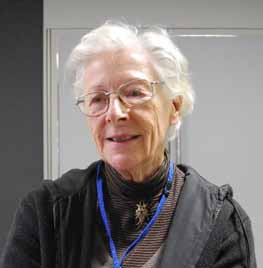Anthropologist conveys tragedy of forced deportation of Palestinians
Jan. 9, 2009
by Miho Kuwajima, Staff Writer
Rosemary Sayigh, 81, an anthropologist who collects testimonies of Palestinian refugees, spoke in Hiroshima in December, saying, “They have been deprived, not only of their country, but of their jobs, their human rights, and their futures.” Dr. Sayigh was addressing a symposium to commemorate the 60th anniversary of “Nakba,” which refers to the tragedy of the forced deportation of 800,000 to 1 million Palestinians from their land due to the establishment of the state of Israel in 1948.
Since the 1970s, Dr. Sayigh has been interviewing Palestinians living in Israel, the Palestinian autonomous region, and refugee camps in Lebanon in order to collect their testimonies. She has compiled two books of their accounts and shares them on her website as well, titled VOICES: Palestinian Women Narrate Displacement.
Dr. Sayigh grew up in a middle class family in a suburb of London with no exposure to the issues of the Middle East. However, after marrying a Palestinian economist, she moved to Beirut in 1953. As a result of the Six-Day War in 1967, she began to question the “arrogant attitude” of Israel and decided to seek out the experiences of Palestinians, starting with her husband’s relatives.
There are now roughly 4,620,000 Palestinian refugees in the world. “Every Palestinian is carrying their private suffering. But the U.S. media dominates the world’s news coverage and so reporting on Palestinian issues has always been very one-sided,” says Dr. Sayigh. In the continuing air raids on the Gaza Strip by Israeli forces that began on December 27, more than 370 people* have been killed.
“Nakba isn’t over,” insists Dr. Sayigh. “Just as the voices of the A-bomb survivors have been playing a significant role in the movement to abolish nuclear weapons, it is important to disseminate the testimonies of the Palestinian refugees.” Though she stayed in Hiroshima for only three days in her first visit to the city, besides taking part in the symposium, she spent time at Peace Memorial Museum and interacted with an A-bomb survivor. Although her husband passed away in 2004 and she now lives alone in Beirut, she maintains a vigorous lifestyle, walking every day and swimming in an indoor pool once a week even in winter.
(Originally published on December 31, 2008)
*The number of victims has now exceeded 670 as of January 7, 2008.
Related articles
Symposium held to convey memories of Palestine and Hiroshima (Dec. 18, 2008)
Rosemary Sayigh, 81, an anthropologist who collects testimonies of Palestinian refugees, spoke in Hiroshima in December, saying, “They have been deprived, not only of their country, but of their jobs, their human rights, and their futures.” Dr. Sayigh was addressing a symposium to commemorate the 60th anniversary of “Nakba,” which refers to the tragedy of the forced deportation of 800,000 to 1 million Palestinians from their land due to the establishment of the state of Israel in 1948.
Since the 1970s, Dr. Sayigh has been interviewing Palestinians living in Israel, the Palestinian autonomous region, and refugee camps in Lebanon in order to collect their testimonies. She has compiled two books of their accounts and shares them on her website as well, titled VOICES: Palestinian Women Narrate Displacement.
Dr. Sayigh grew up in a middle class family in a suburb of London with no exposure to the issues of the Middle East. However, after marrying a Palestinian economist, she moved to Beirut in 1953. As a result of the Six-Day War in 1967, she began to question the “arrogant attitude” of Israel and decided to seek out the experiences of Palestinians, starting with her husband’s relatives.
There are now roughly 4,620,000 Palestinian refugees in the world. “Every Palestinian is carrying their private suffering. But the U.S. media dominates the world’s news coverage and so reporting on Palestinian issues has always been very one-sided,” says Dr. Sayigh. In the continuing air raids on the Gaza Strip by Israeli forces that began on December 27, more than 370 people* have been killed.
“Nakba isn’t over,” insists Dr. Sayigh. “Just as the voices of the A-bomb survivors have been playing a significant role in the movement to abolish nuclear weapons, it is important to disseminate the testimonies of the Palestinian refugees.” Though she stayed in Hiroshima for only three days in her first visit to the city, besides taking part in the symposium, she spent time at Peace Memorial Museum and interacted with an A-bomb survivor. Although her husband passed away in 2004 and she now lives alone in Beirut, she maintains a vigorous lifestyle, walking every day and swimming in an indoor pool once a week even in winter.
(Originally published on December 31, 2008)
*The number of victims has now exceeded 670 as of January 7, 2008.
Related articles
Symposium held to convey memories of Palestine and Hiroshima (Dec. 18, 2008)








